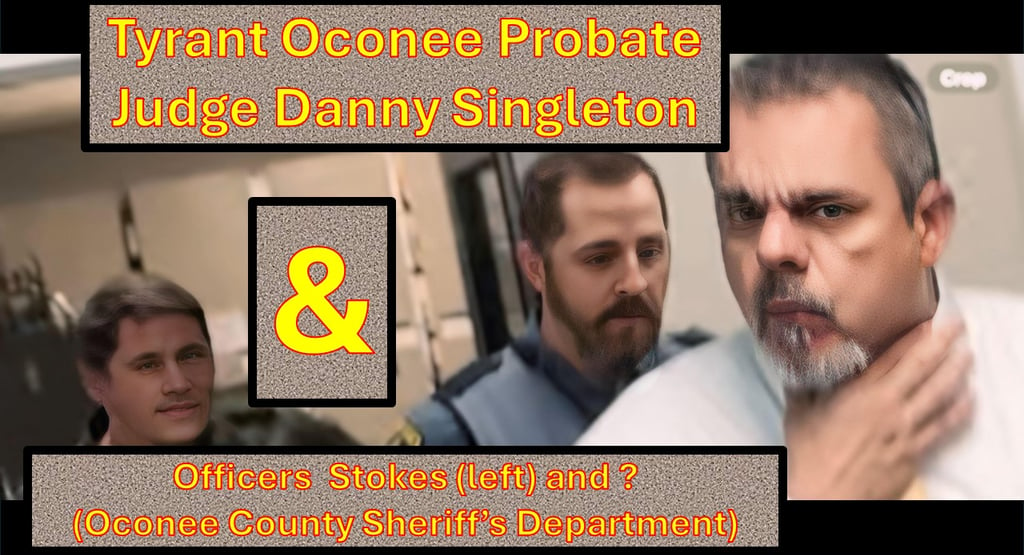Probate Judge Danny Singleton's Actions Raise Serious Questions of Judicial Misconduct
Man, while exercising his rights, is incarcerated when judge retaliates


Introduction
In what has become a contentious and closely watched legal battle, Dr. Jason Michael Boyle, a resident of Seneca, South Carolina, has filed an appeal that could reshape the conversation around judicial conduct in the state. Boyle’s appeal, directed against Oconee County Probate Judge Danny Singleton, details a series of incidents that Boyle alleges constitute judicial overreach, constitutional violations, and a blatant misuse of authority. The case has escalated from a local probate dispute into a significant legal battle that may have lasting implications for the judiciary in South Carolina.
Background: A Probate Dispute Turns Personal
The conflict between Boyle and Judge Singleton began on October 24, 2023, when Boyle visited the Oconee County Probate Office to deliver a Notice of Appeal. This notice, filed on behalf of his fiancée, Dorothy Pierce, contested a settlement order in the estate of Dorothy’s late husband, Doyle Elton Pierce. He passed in 2020. While waiting in the probate lobby, Boyle overheard a conversation between Judge Green, an assistant probate judge, and an older man discussing the possibility of the man having papers filed by a lawyer. Boyle, trying to be helpful, informed the man that he also had the right to represent himself pro se.
Unbeknownst to Boyle, this interaction would be the spark that ignited a much larger conflict. Judge Singleton, who was not present during the conversation, later sent an email to the parties involved in the Pierce Estate case, excluding Boyle, where he accused Boyle of illegally offering legal advice. Singleton further banned Boyle from entering the probate court lobby, a decision that Boyle claims was made without any due process and based on hearsay rather than direct observation.
The Email and Its Aftermath
The email sent by Judge Singleton not only accused Boyle of giving illegal legal advice but also included defamatory remarks that Boyle argues were intended to tarnish his reputation. Singleton’s email claimed that Boyle interrupted a judge, offered unsolicited legal advice, and generally caused a disturbance. However, Boyle maintains that he merely informed a citizen of their rights, an action he believed was within his own rights.
Despite these accusations, Boyle continued to visit the probate court to file documents on behalf of Pierce, with no further incidents until May 24, 2024. On that day, Boyle entered the probate court lobby and recorded himself paying an invoice related to the estate case. The recording, which Boyle posted on YouTube, was intended to document the transaction but included remarks critical of Judge Singleton’s qualifications and conduct.
Retaliation and Legal Escalation
The YouTube video quickly escalated the conflict. In the video, Boyle expressed frustration with Judge Singleton, questioning his qualifications and intelligence. This public criticism did not sit well with Singleton, who viewed it as a personal attack. In retaliation, Singleton initiated legal action against Boyle, leading to a series of events that included Boyle’s arrest and incarceration.
On May 28, 2024, an Oconee County Deputy attempted to serve Boyle with a Rule to Show Cause (RTSC), requiring him to appear in court to explain why he should not be held in contempt. Boyle went to the probate court the following day to obtain the RTSC and requested to speak with Judge Singleton. What followed was Judge Singleton calling the Oconee County Sheriff’s Department, leading to four deputies arriving at the scene. Boyle recorded the entire interaction, which clearly shows there was no confrontation, even at the time of arrest. After some time, during which the probate court could not produce the RTSC, Singleton demanded that Boyle delete the video from his phone or be held in contempt. The video evidence was Boyle’s only defense to prove that he had remained calm and orderly. When Boyle refused, citing his rights under the First Amendment, Singleton ordered his immediate arrest, resulting in Boyle being sentenced to 10 days in jail without a trial—a clear violation of his right to due process, according to his appeal.
The Issue of the Unposted Order
A critical point in Boyle’s appeal is the fact that the order used to justify his incarceration was never posted on the courthouse door, as required by the order itself. The South Carolina Supreme Court Administrative Order, which restricted the use of electronic devices in courthouses, explicitly stated that the order "shall" be posted on the courthouse doors. This posting requirement was intended to ensure that all visitors to the courthouse were adequately informed of the restrictions.
Boyle asserts that on the day he was sentenced for recording his interaction at the probate court, there was no such order posted on the door, and he was unaware of the restrictions it imposed. The video evidence Boyle recorded even shows him walking through the courthouse doors without any notice of the order being visible. This lack of proper notification is a significant factor in Boyle’s argument that his due process rights were violated. Without proper notice, Boyle contends, he could not have knowingly violated the order, making his subsequent arrest and incarceration unlawful.
June 17 Hearing: A Judicial Conflict of Interest?
The legal battle reached its peak during a criminal trial on June 17, 2024, where Boyle faced charges of direct criminal contempt. Despite having applied for a public defender, Boyle was forced to represent himself after his request for a continuance to secure legal representation was denied by Singleton. The appeal contends that this denial was part of a broader pattern of judicial misconduct and overreach by Singleton.
During the trial, Boyle argues that Singleton improperly acted as the moving party, witness, prosecutor, victim, and judge—a combination of roles that the appeal claims violates Boyle’s constitutional right to a fair trial. Singleton not only presided over the proceedings but also testified from the bench about the facts of the case, further blurring the lines between judge and litigant.
Boyle’s appeal highlights that Singleton’s actions were not just procedurally improper but also motivated by personal animosity. Singleton’s involvement in the case went beyond the typical duties of a judge; he actively sought to punish Boyle for what he perceived as personal slights. This included forcing Boyle to delete potentially exculpatory video evidence, a demand that Boyle refused, leading to his immediate imprisonment.
The Problem of Case Numbers: Legal Chaos and Injustice
A particularly troubling aspect of Boyle’s case is the issue of case numbers—or the lack thereof. The initial Rule to Show Cause (RTSC) summons was issued using the case number of the Doyle Pierce estate, even though the contempt charges against Boyle were unrelated to the estate matter. This misapplication of the case number blurred the lines between civil and criminal proceedings, causing confusion and complicating Boyle’s defense.
Even more concerning is the fact that the three subsequent sentencing orders issued by Judge Singleton contained no case numbers at all. Boyle argues that being held in jail for a total of 40 days without a case number attached to the sentencing orders is a serious violation of legal procedure and a gross miscarriage of justice. The absence of case numbers not only rendered the orders legally questionable but also made it nearly impossible for Boyle to appeal or challenge the decisions in a systematic way. This lack of accountability and transparency in the judicial process is a central point of contention in Boyle’s appeal.
Key Legal Arguments: Challenging Judicial Authority
Boyle’s appeal to the South Carolina Court of Common Pleas is built on several critical legal arguments, each challenging the legitimacy of Judge Singleton’s actions and raising broader concerns about the conduct of the judiciary in South Carolina.
Defamation and Due Process: Boyle argues that the email sent by Judge Singleton was defamatory and that his subsequent ban from the probate court lobby was issued without due process, violating Boyle’s 14th Amendment rights.
First Amendment Infringement: Boyle’s recordings in the probate court lobby, he contends, were protected under the First Amendment. By retaliating against Boyle for his public criticism, Singleton infringed on Boyle’s right to free speech.
Jurisdictional Overreach: The appeal asserts that the probate court overstepped its jurisdiction by prosecuting Boyle for direct criminal contempt—a charge that Boyle argues should not have been handled by a probate court, which has limited jurisdiction focused on estate matters, marriage and death.
Failure to Post the Order: A key aspect of Boyle’s defense is that the order used to incarcerate him was never posted on the courthouse door, as required by the order itself. Boyle contends that without this notification, he could not have knowingly violated the order, making his incarceration unlawful.
Absence of Case Numbers: The use of the Doyle Pierce estate case number in the initial RTSC summons and the subsequent omission of case numbers on the sentencing orders are central to Boyle’s argument that his rights were violated. Boyle was held in jail for 40 days under orders that lacked the basic legal requirement of a case number, which he argues is a severe breach of legal protocol and due process.
Right to Legal Representation: Boyle’s appeal emphasizes that he was denied effective legal representation during the June 17 trial, a violation of the Sixth Amendment. Although Boyle had applied for a public defender, the public defender’s office withdrew from the case, mistakenly characterizing it as a civil matter rather than a criminal one. This withdrawal, Boyle argues, left him defenseless in a complex legal situation where his liberty was at stake.
Procedural Misconduct: The appeal also points to numerous procedural errors, including Singleton issuing orders without proper case numbers, engaging in ex parte communications with witnesses and legal parties, and failing to maintain a proper record of proceedings—all of which Boyle contends undermined the fairness of the trial.
Miranda Rights Violation: Boyle alleges that his Miranda rights were violated when he was interrogated by law enforcement about his interactions with the court and his legal representation without being informed of his right to remain silent or to have an attorney present.
A Call for Broader Judicial Accountability
Boyle’s appeal does more than seek to reverse his conviction and clear his record; it also calls for a broader examination of the powers and accountability of the judiciary in South Carolina. The appeal challenges the South Carolina Supreme Court Administrative Order regarding the use of electronic devices in courthouses, arguing that it is unconstitutional and overbroad, infringing upon First and Fourth Amendment rights.
The appeal also underscores the dangers of unchecked judicial power, where personal biases and vendettas can lead to severe consequences for those who challenge the authority of the court. Boyle’s case, if successful, could set a precedent that redefines the boundaries of judicial conduct and reinforces the need for constitutional protections within the legal system.
Conclusion: A Case with Far-Reaching Implications
As Dr. Jason Michael Boyle’s appeal moves through the South Carolina legal system, it highlights critical issues surrounding judicial misconduct, the protection of constitutional rights, and the need for accountability within the judiciary. The outcome of this case could have significant implications not only for Boyle but also for the broader judicial landscape in South Carolina. In a system built on the principles of justice and fairness, Boyle’s legal battle serves as a crucial reminder that these values must be upheld by all, including those entrusted with the power to judge
